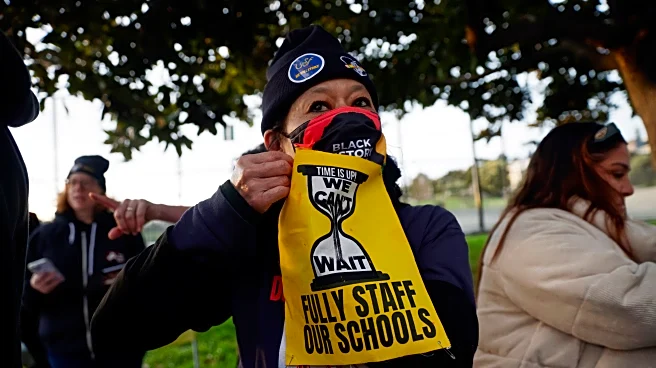What's Happening?
Morgan Stanley is under scrutiny by a US House of Representatives committee for its role in underwriting Zijin Gold International's IPO in Hong Kong. The committee, led by Representative John Moolenaar,
expressed concerns that Morgan Stanley's involvement could expose US investors to regulatory, financial, and reputational risks. Zijin Gold is a subsidiary of Zijin Mining Group, which is on the US government's Uyghur Forced Labor Prevention Act Entity List due to alleged human rights abuses in China's Xinjiang region. The committee is investigating whether Morgan Stanley's actions might have helped Zijin Mining circumvent US prohibitions. Morgan Stanley has not commented on the matter, and the committee has requested documents and communications from the bank by November 27.
Why It's Important?
The inquiry into Morgan Stanley's involvement with Zijin Gold highlights the ongoing tension between US financial institutions and Chinese companies linked to human rights abuses. This situation underscores the challenges US firms face in balancing business interests with ethical considerations and compliance with US laws. The outcome of this investigation could impact Morgan Stanley's reputation and influence future dealings between US financial entities and Chinese firms. It also reflects broader geopolitical tensions and the US government's efforts to deter forced labor practices globally, potentially affecting US-China economic relations.
What's Next?
The House committee has set a deadline of November 27 for Morgan Stanley to provide requested documents and communications. The investigation may lead to further actions or sanctions against Morgan Stanley if it is found to have violated US regulations. Other US financial institutions involved in similar IPOs may also face increased scrutiny, potentially leading to stricter compliance requirements and changes in how they engage with Chinese companies. The situation could prompt discussions on the ethical responsibilities of US firms in international markets.
Beyond the Headlines
This investigation raises ethical questions about the role of US financial institutions in supporting companies linked to human rights abuses. It may lead to increased pressure on these institutions to adopt more rigorous due diligence processes and ethical standards when engaging with foreign entities. The case also highlights the complexities of global business operations and the need for transparency and accountability in international finance.











